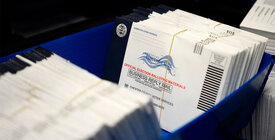The Brennan Center is tracking a series of deceptive tactics used by organizations and individuals seeking to manufacture information to create false perceptions of our election processes and voting. Such tactics include making secret recordings, doctoring videos, spreading unreliable or false data, and making false representations to gain access to people and places that would otherwise be inaccessible. In 2024, deceptive tactics have reemerged to target immigrants and sow doubt in our elections. But, as set forth below, many who have employed these tactics and spread lies have been held civilly or criminally accountable for their actions or had their claims discredited.
When false claims about election integrity and voting arise based on “undercover” reporting or other vigilante investigations, they should be met with deserved deep skepticism. Discreditation is likely to follow.
